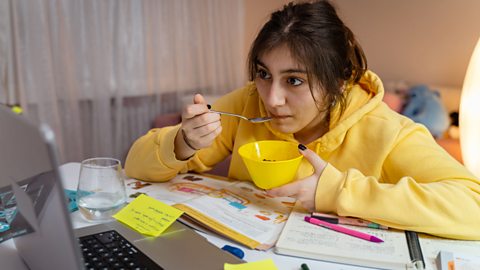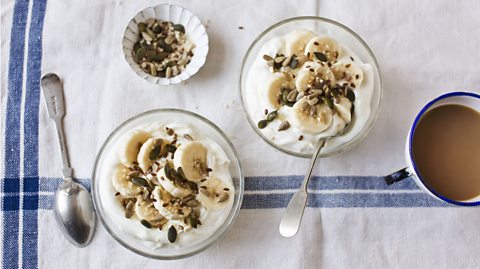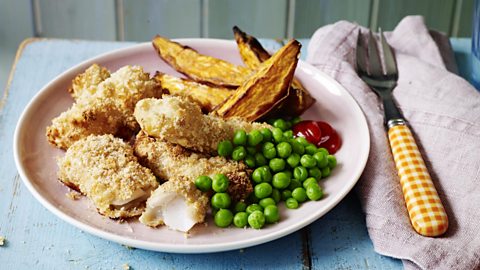Can food improve your exam performance?

GCSEs, Nationals, A-levels and Highers will be taking place May-June in the UK. If you’re one of the many 16 and 18 year-olds sitting exams (or helping a loved one through them), here’s how your diet can help support you…
by Dr Alex Richardson
When you're faced with a pile of revision, feeding your body as well as your brain may be the last thing on your mind. But science suggests you can give yourself an advantage simply by eating certain foods and drinks.
Whether you're a student or the parent of a child sitting school exams, these quick and easy food tips will help maintain energy levels and improve concentration and memory.
What's the best breakfast on exam days?
Research shows that pupils and students who eat breakfast perform better in exams.
For the best breakfast, include slow-release carbohydrates, such as whole rolled porridge oats, whole grain bread or low-sugar muesli, as they provide slow-release energy. Add a protein food, such as milk, yoghurt or eggs, to keep you feeling full for longer.
On exam day aim to include a portion of a food rich in long-chain Omega-3 fats, such as smoked salmon, as they are believed to have brain-boosting properties.
Take a look at our collection of exam-day breakfast ideas for some inspiration.
These breakfasts are filled with oats which are a slow-release carbohydrate
Crunchy banana yoghurt
Banana and yoghurt are a perfect combination that will keep you going until lunchtime.

How can drinking water improve your grades?
One of the best ways to maximise your focus is to stay hydrated. Even mild dehydration can lead to tiredness, headaches, reduced alertness and diminished concentration.
Take a bottle of water into the exam if you’re allowed to; a study of university students found those who brought drinks, especially water, with them into the exam performed on average 5% better than those who didn't.
Start the day with a big glass of water or fruit tea. The NHS recommends we drink 6-8 cups a day. Water is ideal, but other drinks such as milk and small amounts of fruit juice count.
Tea and coffee count too, but are high in caffeine. It's best to avoid sweet fizzy and energy drinks, which are high in sugar, as they'll lead to energy peaks and troughs.
Donal Skehan shows you how to make drinking water more interesting.
How important is drinking water?
Donal Skehan shows you how to make water more interesting
Hi, I’m Donal Skehan and I love water. But if you are going to drink five to sixglasses a day, you’ve got to make it interesting, and I have a few tips to dojust that. A great addition to water is some mint, and if you want to get the best flavourfrom it, just whack it against a board and instantly you get that aroma beingreleased around the room. It goes straight into the glass. And if you want tomake it even more interesting I’m going to add some slices of ginger. Slices ofginger like this are going to add a really great subtle heat and an extradimension of flavour into your mint water. So a few slices of ginger, andyou’ve got the mint going on in there, and then just top it up with somesparkling water. One ingredient which gives unexpected flavour to water is a cucumber. It hasthis fresh, cooling fragrance and it really injects lots of flavour into the water.So, a few slices – you only need about three to get the best flavour from it –just a few slices in with some still water make all the difference. It’s a reallycool and refreshing drink. Two ingredients I always have in my house are lemons and limes; and addedto some water they really add lots of flavour. So just a few slices make all thedifference. The great thing of that combination of lemon and lime is theacidity. You get this really beautiful sweet and fragrant acidity and added to aglass of water it just becomes electric; so in with some sparkling water.One of my favourite tips in the summer time is to freeze some berries in icecubes; it looks fantastic and it adds a great bit of flavour in to your glass ofwater. So I’ve got some frozen blackberries, I’ve got some frozen raspberries,and the great thing about this as they melt down in the water they’re going toadd great flavour to the water. So in there with some still water and if youwanted to you could also add a bit of apple juice or orange juice to the icecubetray and that gives great flavour too.
Which foods will help you focus?
Eating a balanced diet can help you focus and avoid illness. No single food is nutritionally complete, so you need variety. Try not to skip meals or your blood-sugar level will drop.
Good fats
In the West we consume more than enough Omega-6, found in vegetable and seed oils, but not enough Omega-3 (which is important for brain power), found in oil-rich fish and seafood.
These dishes are rich in omega-3
Vegetables
Vegetables contain fibre, which slows down digestion, causing energy in food to be released more slowly and so helping you to avoid energy peaks and troughs. Good sources of fibre include carrots and broccoli. Iron is particularly key during exam time, as a deficiency (identified in over 40% of US teenage girls) leads to tiredness and lack of focus; dark leafy greens are a source.
Looking to up your veg and increase your iron and fibre levels in the process? These recipes will help
Fruit
Fibre slows down digestion and so causes energy in food to be released into the body more slowly; apples, pears, raspberries and bananas are good sources. Try sprinkling frozen berries or dried fruit on to porridge. Vitamin C is needed for your immune system, and is found in fruit and vegetables; oranges and kiwi fruit are particularly good sources.
These fruity dishes are packed with fibre
Protein
Fantastic fish fingers
Popular with all ages, fish fingers are a great source of protein

Oil-rich fish and seafood are important for brain health and some studies say it can improve concentration, thanks to their ‘long-chain Omega-3s’.
We should eat a portion of Omega-3-rich foods at least 2 days a week.
It’s condensed in salmon, sardines, fresh tuna (not canned), trout and mackerel; even fish fingers contain some.
However, short-chain Omega-3s, found in nuts and seeds, are less effective as we can struggle to convert them into long-chain ones.If you have an iron deficiency, red meat is a good source for it.
Whole grains
Slow-release carbohydrates such as whole grain bread, wholemeal pasta, brown rice and porridge help keep your blood-sugar level stable, averting dips in concentration and brain power. Research indicates only 17% of adults and 6% of children are eating enough whole grains. Eating three slices of whole grain bread or one bowl of whole grain cereal with one slice of bread per day will provide all the whole grains you need.
These wholegrain dishes will impress teenagers
What should you eat for a good night's sleep?
Not getting enough sleep may negatively affect your memory and slow your responses. Experts believe memory neurons that are responsible for converting short-term memories into long-term ones work most effectively when we are asleep. There's evidence that students who sleep for seven hours a night perform better than those who get less sleep. But what should you eat and drink at bedtime to promote sleep?
A heavy meal too close to bedtime can interfere with sleep, so try to have your last meal at least three hours before you go to bed.Then have a small snack such as a bowl of high-fibre cereal like porridge just before bedtime. If you need sweetener with cereal, go for dried fruit rather than sugar.
Avoid foods and drinks that contain caffeine, such as tea, coffee, cola and chocolate, for at least four hours before going to bed. Some people who are very sensitive to caffeine can still feel the effects 12 hours later. A warm glass of milk at bedtime can help you sleep better.
Originally published May 2019. Updated April 2024